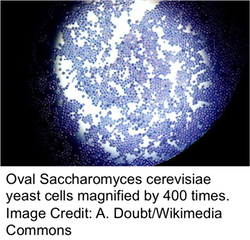Gregory Stephanopoulos, with the Willard Henry Dow Professor of Chemical Engineering at MIT has discovered a way to boost yeast tolerance to ethanol by altering the composition of the medium in which yeast are grown. “Toxicity is probably the single most important problem in cost-effective biofuels production,” said Stephanopoulos. The research was published in the journal, Science.
Ethanol and other alcohols can disrupt yeast cell membranes, eventually killing the cells. The MIT team found that adding potassium and hydroxide ions to the medium in which yeast grow can help cells compensate for that membrane damage. By making these changes, the researchers were able to boost yeast’s ethanol production by about 80 percent. They found the approach works with commercial yeast strains and other types of alcohols, including propanol and butanol, which are even more toxic to yeast.
 “The more we understand about why a molecule is toxic, and methods that will make these organisms more tolerant, the more people will get ideas about how to attack other, more severe problems of toxicity,” explained Stephanopoulos.
“The more we understand about why a molecule is toxic, and methods that will make these organisms more tolerant, the more people will get ideas about how to attack other, more severe problems of toxicity,” explained Stephanopoulos.
The research team began its quest searching for a gene or group of genes that could be manipulated to make yeast more tolerant to ethanol, but this approach did not yield much success. Yet when the researchers began to experiment with altering the medium in which yeast grow, they found some dramatic results. By augmenting the yeast’s environment with potassium chloride, and increasing the pH with potassium hydroxide, the researchers were able to dramatically boost ethanol production. They also found that these changes did not affect the biochemical pathway used by the yeast to produce ethanol: Yeast continued to produce ethanol at the same per-cell rate as long as they remained viable. Instead, the changes influenced their electrochemical membrane gradients — differences in ion concentrations inside and outside the membrane, which produce energy that the cell can harness to control the flow of various molecules into and out of the cell.
Ethanol increases the porosity of the cell membrane, making it very difficult for cells to maintain their electrochemical gradients. Increasing the potassium concentration and pH outside the cells helps them to strengthen the gradients and survive longer; the longer they survive, the more ethanol they make.
Researchers are also working on using this approach to boost the ethanol yield from various industrial feedstocks that, because of starting compounds inherently toxic to yeast, now have low yields.

